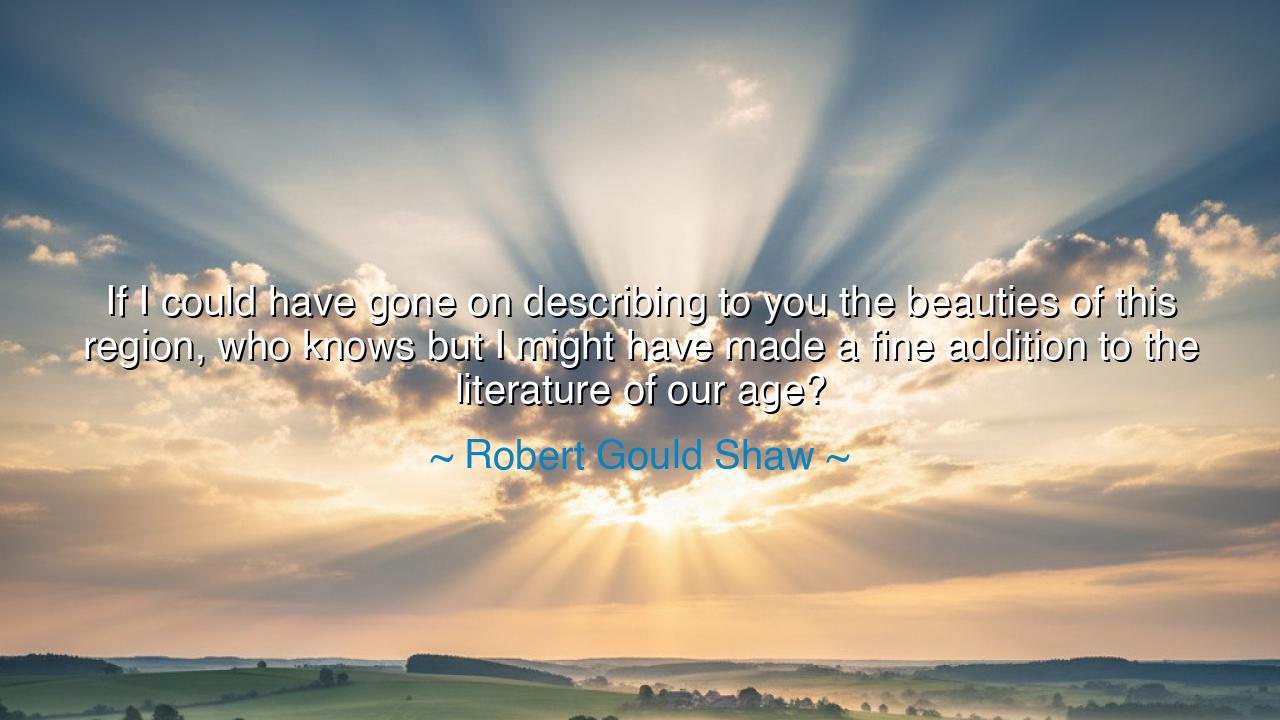
If I could have gone on describing to you the beauties of this
If I could have gone on describing to you the beauties of this region, who knows but I might have made a fine addition to the literature of our age?






In the span of human history, there are moments when the soul yearns to speak, to describe the wonders that stir it—whether those be the grand landscapes of the earth, or the profound beauties of life itself. Robert Gould Shaw, a man whose life was both brave and tragic, speaks of this yearning when he says, "If I could have gone on describing to you the beauties of this region, who knows but I might have made a fine addition to the literature of our age?" His words reflect not just the desire to immortalize the world’s wonders in words, but the deep realization that our capacity for expression is linked to our ability to share the beauty we witness in life.
Shaw’s thoughts echo the ancient wisdom that the power of words has the ability to shape our understanding of the world. In the time of Homer, the epic tales of heroes and gods were not merely stories but were the vessels through which the beauty of human experience was communicated to future generations. The Iliad and Odyssey preserved the legacy of the Greeks, offering a lens through which the soul of their age could be seen. Much like Homer, Shaw saw the potential of his words to contribute to the greater tapestry of human experience. In the simple act of describing the landscapes around him, he could have carved a place for himself in the history of literature, sharing with future generations a piece of the beauty he saw and felt.
Yet, Shaw’s reflection also reveals a sense of limitation, a recognition that the beauty of the world can often be too vast, too overwhelming for words to fully capture. There is a humility in his statement, for he understands that even the most eloquent descriptions fall short of expressing the true essence of what he experiences. This is the same sentiment that Plato conveyed through his dialogues, where he often expressed the belief that the truth could never be fully conveyed through mere words. The philosophers of ancient Greece, too, struggled with the limitations of language, knowing that the wisdom they sought was often elusive, not fully expressible through human speech.
In our own time, the world remains full of beauty, much of which often goes unnoticed amidst the busyness of daily life. Much like Shaw, we too have the potential to leave our mark on the world through our words and our art, yet many find themselves hesitant, knowing that the fullness of life is too vast for any single creation to contain. However, the ancient poets and storytellers were not discouraged by these limitations. They recognized that the value of their work was not in the completeness of their vision but in the honesty with which they sought to capture the world around them. The great authors and artists throughout history, from Shakespeare to Van Gogh, did not try to encompass all that could be seen or felt; instead, they expressed their individual experience of the world, and in doing so, they created something timeless.
Consider the example of Walt Whitman, whose poetry sought to capture the vastness of the American landscape, the experiences of its people, and the deep human connection that unites all. In his famous work, Leaves of Grass, Whitman wrote of the individual and collective experience, celebrating both the beauty of nature and the complexity of human life. Like Shaw, he was aware of the limitations of his words, but instead of retreating from the challenge, he embraced it. Whitman’s work became a key part of the literature of his age, not because it provided an exhaustive account, but because it expressed the human experience with honesty and vitality.
The lesson in Shaw’s reflection is one of acceptance and courage—acceptance of the limitations we face in our attempts to express the beauty we see in the world and courage to continue expressing it anyway. Life’s most profound moments—whether they occur in the quiet of nature or in the depth of human interaction—are often beyond the grasp of language. But to try, to give voice to our feelings, our observations, and our reflections, is to contribute something meaningful to the ongoing story of humankind. Just as Shaw longed to capture the beauty of the world around him, so must we embrace the act of creation—whether through words, art, or action—not for the sake of completeness, but for the joy of sharing our piece of the world with others.
Therefore, let us not be discouraged by the limits of our expressions. Instead, let us take Shaw’s words as a call to action: to seek out the beauty in the world, to describe it to the best of our abilities, and to trust that in doing so, we are adding to the literature and legacy of the ages. Just as Homer’s tales live on through the centuries, so too will our efforts, humble as they may seem, contribute to the timeless narrative of humanity.






AAdministratorAdministrator
Welcome, honored guests. Please leave a comment, we will respond soon